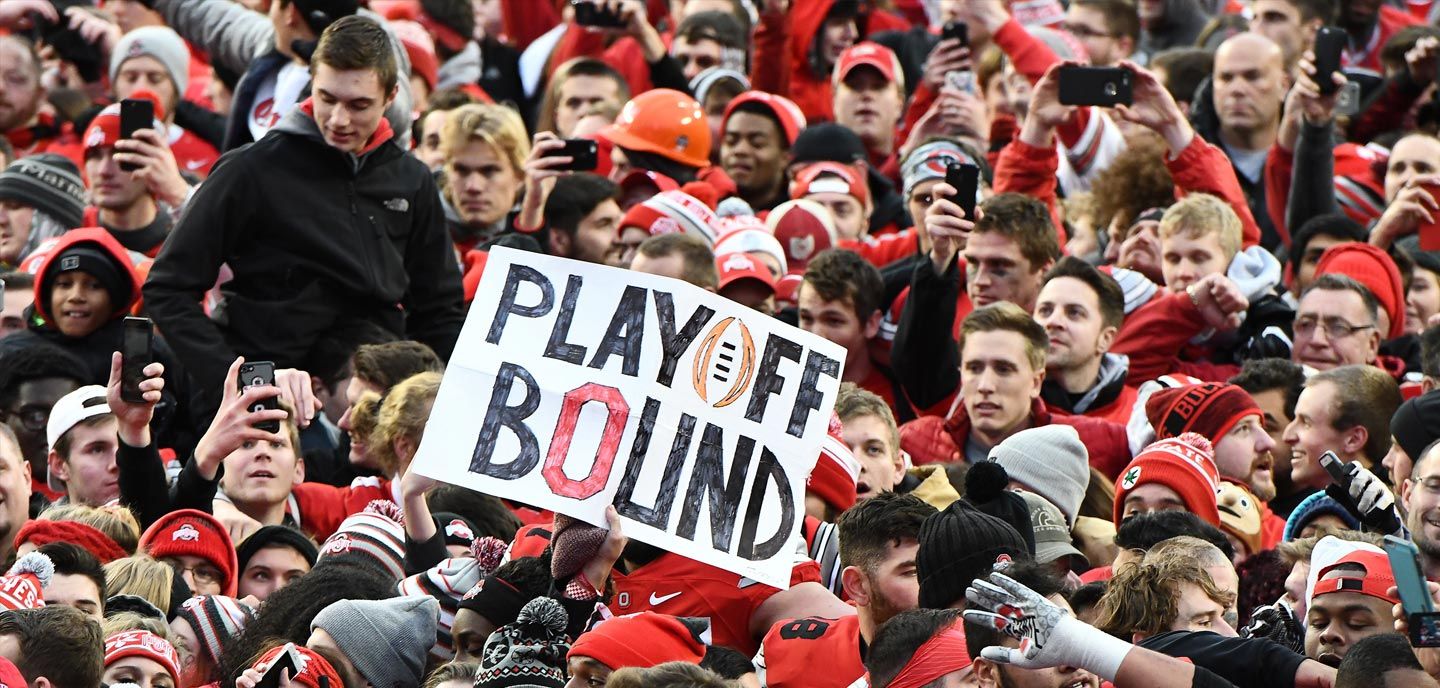It’s finally over for another year. The season-long discussion about which four teams the College Football Playoff selection committee will choose to play for the National Championship came to an end Sunday afternoon. The verdict: Alabama, Clemson, Ohio State, Washington.
But, of course, it’s never really over, is it?
After a week of mayhem predicted by the possibility of #3 Clemson or #4 Washington losing in their conference championship games and what that could mean for Michigan, Penn State, Wisconsin, Oklahoma—even three loss USC made the discussion as the outlier nobody wants to play right now—both teams eventually won, essentially wasting the analysis.
Wasting, yes, but also creating a whole new set of scenarios and comparisons to drive into the ground: Why was Penn State left out if they won the conference game and beat Ohio State? Isn’t Michigan really one of the top four teams in the country? How could Ohio State get in without even playing in their own conference championship? Was Washington’s schedule sufficient to justify being in final four?
All season long—but especially as we get nearer the close of the regular season—discussions center on the “justness” of one team being in over another.
One loss teams create a deluge of opinion and justification, of argumentation and accusation—even undefeated teams with the “wrong” pedigree create tons of problems—and the last few weeks always come full of heated debate.
Here are four problems with the playoff selection process that only God can ultimately solve:
The Problem of Assessing a Full Body of Work
Analysts are tasked with comparing 6-8 teams “full body of work” against one another.
Get our "Top Articles" sent to your inbox weekly.
While it sounds straightforward enough to consider a team’s full body of work in a comparative fashion, the very idea is humanly impossible. We can barely talk intelligently about the team we might pay closest attention to all season let alone those for whom we only see in short, out-of-context clips.
Attempting to take seriously the entire season of all teams is a practical impossibility, even for those whose daily job involves studying and discussing the teams.
Nobody has access to the “full body of work” except God alone. Our best efforts to assess a season—or a life—always fall short. We always judge teams and people according to the small amounts of information we can actually access.
Only God truly sees every last detail. Everyone else is guessing and piecing things together imperfectly.
The Problem of Our Ever-Present Biases and Prejudices
It’s impossible to completely remove our own prejudices and biases, those pre-conceived and emotionally carved aspects of our viewing grid that cause us to favor one conference over another, one team over another, one coach over another.
Our loves and hates keep us from doing justice to other humans in spite of our best efforts. Memories work viciously against objectivity. This is true for the average fan and just as true—though perhaps significantly more masked—for TV analysts and selection committee participants.
Isn’t it interesting how a viewed event can produce such extremely different opinions regarding what happened? We tend to see what we want and what we hope to be true.
Watch this conclusion:
As compared to this one:
Our own emotional histories regarding the exact same events—the raw material of our biases and prejudices—make arriving at just conclusions almost impossible.
As humans, our selective memory regarding both ourselves and our opponents lead us to emphasize the good and diminish the bad, to accentuate the perceived injustices done to our team and to ignore the failures that others see more easily.
It seems obvious enough but it’s always worth repeating: God doesn’t suffer from skewed judgement. All his judgments are righteous and just. He doesn’t bring prejudices with Him when evaluating a situation. He’s only prejudiced toward Himself.
Indeed, in the grand narrative, He goes beyond what can be seen and judges the intentions of the heart, the motivations that sometimes elude even the actor himself.
Rather than comparing our lives against one another as though grading on some sort of cosmic curve, God measures our lives against His own standard of justice, against his plans and purposes for the universe and our place in it.
Only God can evaluate the details of our lives without prejudice or bias.
The Problem of a World System
It will sound horribly cynical, but cash flow and audience ratings will always weigh heavier than full body of work justice-seeking, and certain teams will always be overlooked in favor of others regardless of the season they put together.
The committee and others who are conscious of dollars at stake understand that some teams will always be a better draw and create more interesting match-ups than other teams. It can never fully be acknowledged, but bottom-line will always play a significant role in decisions like this.
Again, the only bottom line that influences God is His own glory. He is not like the Greek and Roman gods who were driven by motives that parallel our own human struggles and longings. Jehovah rises completely above the world and all that drives it.
Only God is 100% motivated by the kingdom of heaven and completely untouched by values driving the kingdoms of men and women.
The Problem of a Works-Based System
Regarding the spiritual realm, most Americans believe that God deals with us the same way that the College Football Playoff selection committee deals with football teams.
According to a 2015 Barna Study, “Many adults believe that they will go to heaven as a result of their good works. Broadly speaking, this is the most common perception among Americans who have never made a commitment to Jesus—and it is also quite common among self-identified Christians.”
The irony: we express frustration at the unfairness and imperfection of the CFP selection committee decision making process, yet we seem to fully embrace God using a similar works based system to judge us. We hope in the end He sees things our way.
Thankfully for us, He doesn’t.
While the CFP selection committee necessarily gets it wrong regarding individual teams, God never gets it wrong regarding individual lives.
With all of the competing factors that go into determining the top four teams, we will never find a perfect system that gets it right every time. Or even most of the time. There are too many contradicting complexities at play.
But God does not blink at the complexities surrounding His dealings with us or the details of our lives.
Regardless of the relative overall “goodness” or “badness” surrounding our life choices, we ultimately stand guilty before a perfect God, fully dependant on receiving a grace gift that comes from His son Jesus Christ to make the final bracket.
In His book Desiring God, John Piper writes that in the gospel we see how “The wisdom of God has ordained a way for the love of God to deliver us from the wrath of God without compromising the justice of God.”
There will always be teams after the playoff and bowl picture is set who feel they received just positioning, and no matter what, there will be more than a handful who feel they were somehow cheated.
But there won’t be anyone at the end of time who can claim they were unfairly dealt with by God. He gets it right—every time.














